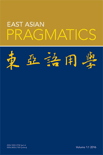
East Asian Pragmatics
Scope & Guideline
Illuminating Pragmatics in East Asian Discourse
Introduction
Aims and Scopes
- Pragmatic Analysis in East Asian Languages:
The journal publishes research that delves into pragmatic theories and their applications within East Asian languages such as Mandarin, Korean, and Japanese, examining how these languages navigate social contexts and communicative intentions. - Intercultural Communication:
Research on how different cultures within East Asia interact through language, including studies on politeness, address terms, and the pragmatic implications of these interactions in multilingual settings. - Repair Mechanisms in Conversation:
A core focus of the journal is on conversational repair mechanisms, addressing how speakers correct misunderstandings or miscommunications in real-time, which is crucial for maintaining social harmony. - Multimodal and Creative Language Use:
The journal explores innovative uses of language in various contexts, including media, online interactions, and everyday conversations, emphasizing the role of creativity in pragmatics. - Contextual and Situational Pragmatics:
Studies geared towards understanding how context influences language use, including situational factors that affect communication strategies and the meanings of pragmatic markers.
Trending and Emerging
- Online Communication and Digital Pragmatics:
Recent publications emphasize the pragmatics of digital communication, exploring how language use adapts in online contexts, particularly in social media and virtual interactions, which has become increasingly relevant in today's digital age. - Interpersonal Relationships and Rapport Management:
There is a growing focus on how language is used to manage interpersonal relationships, including studies on complaint responses and rapport-building strategies in various communicative contexts. - Gender and Language Use:
Emerging research on gendered language practices showcases how language reflects and constructs gender identities, particularly in popular media and everyday interactions, indicating a shift towards exploring intersectional perspectives. - Pragmatic Markers and their Functions:
A trend towards detailed analyses of specific pragmatic markers and their contextual functions has emerged, providing insights into the subtleties of meaning and interaction in East Asian languages. - Cultural Variations in Pragmatic Practices:
Increased interest in how cultural backgrounds influence pragmatic practices and communicative strategies, particularly in multicultural settings, reflects a broader trend towards understanding diversity in language use.
Declining or Waning
- Traditional Politeness Strategies:
Research centered on conventional politeness strategies in East Asian languages, while still relevant, has seen a decrease in focus as scholars explore more nuanced and context-specific aspects of politeness and impoliteness. - Discourse Analysis of Formal Settings:
Studies that analyze language use in strictly formal contexts, such as legal or academic settings, have become less frequent, indicating a shift towards more dynamic and informal communication contexts. - Historical Pragmatics:
Investigations into the historical development of language use and pragmatic markers in East Asian languages have declined, possibly overshadowed by contemporary studies focusing on current language practices. - Static Models of Language Use:
There is a decreasing emphasis on static models of pragmatics that do not account for the fluidity and adaptability of language in social interactions, as researchers increasingly favor dynamic approaches.
Similar Journals

Fluminensia
Unlocking New Perspectives in Language and LiteratureFluminensia, published by the University of Rijeka, Faculty of Philosophy, is a distinguished open-access journal that has been contributing to the fields of Linguistics and Literature since its inception in 1999. With an ISSN of 0353-4642 and an E-ISSN of 1848-9680, this journal offers rigorous peer-reviewed articles, fostering an engaging platform for researchers, professionals, and students alike. Recognized internationally, it holds a Q3 ranking in Linguistics and Language and a Q2 ranking in Literature and Literary Theory for 2023, reflecting its significant impact within these fields. Based in Croatia and serving a global academic community, Fluminensia aims to explore innovative theories and methodologies, promoting critical discourse and scholarly exchange. Researchers will find its broad scope inviting, bridging insights across various disciplines in the arts and humanities. Accessible to all, this journal continues to foster an inclusive academic landscape, ensuring that valuable research is widely disseminated and freely available.

Iberica
Connecting scholars to elevate the discourse in linguistics.Iberica, an esteemed journal published by AELFE, serves as a vital platform for scholarly discourse in the fields of linguistics and language studies. With its inception as an Open Access publication in 1999, Iberica has democratized access to high-quality research, fostering an environment of collaboration and innovation among researchers and professionals alike. Based in Spain at UNIV JAUME I, the journal has witnessed a remarkable ascent in the 2023 category quartiles, achieving a Q1 ranking in Linguistics and Language. Furthermore, its impressive Scopus rankings place it in the top 25% within both the Arts and Humanities and Social Sciences disciplines. Covering a diverse range of topics from theoretical linguistics to applied language studies, Iberica offers a compelling opportunity for academics seeking to contribute to and engage with contemporary issues in the linguistic landscape. As it converges in its publishing years from 2008 to 2024, it continues to set the standard for excellence within its field, making it an essential resource for students, researchers, and language professionals.
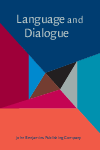
Language and Dialogue
Advancing Dialogue in Language StudiesLanguage and Dialogue is an esteemed journal published by JOHN BENJAMINS PUBLISHING CO, focusing on the interdisciplinary intersections of language use, cultural studies, and literary theory. With an ISSN of 2210-4119 and an E-ISSN of 2210-4127, the journal has established itself as a prominent platform for high-quality research since its inception in 2011. Notably, it is ranked Q1 in Cultural Studies and Literature and Literary Theory, reflecting its prestigious standing in these fields, and has impressive Scopus rankings that further underline its scholarly impact within the arts and humanities. Based in the Netherlands, Language and Dialogue is committed to advancing the understanding of dialogue's role in language and communication, providing a vital resource for researchers, professionals, and students alike. Although not an Open Access journal, it ensures access to cutting-edge research through institutional subscriptions, making it an essential addition to any academic collection in the humanities and social sciences.

East Asian Publishing and Society
Navigating the Evolving Landscape of Media in East AsiaEast Asian Publishing and Society is a critical academic platform dedicated to the exploration of media, communication, and library sciences within the context of East Asia. Published by BRILL, a renowned leader in scholarly publishing, this journal serves as a significant resource for researchers and professionals seeking to understand the dynamic interplay of publishing practices, societal influences, and technological advancements in the region. With its focus on interdisciplinary approaches, the journal encompasses a wide array of topics related to media technology, communication strategies, and information sciences, promoting innovative discourse among academics. Since its inception in 2011, East Asian Publishing and Society has strived to elevate the scholarly landscape, although it currently sits within the lower quartiles of various rankings, reflecting an opportunity for researchers to contribute impactful work. The journal remains accessible to a broad audience, facilitating open discussions, knowledge sharing, and the advancement of scholarship in East Asian contexts.
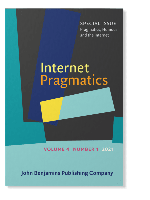
Internet Pragmatics
Unveiling the Nuances of Online InteractionInternet Pragmatics, published by John Benjamins Publishing Company, stands as an essential journal within the fields of Computer Networks and Communications and Linguistics and Language. With an ISSN of 2542-3851 and an E-ISSN of 2542-386X, it has been dedicated to exploring the nuanced interactions and societal implications enabled by the internet since its inception in 2019. The journal has quickly gained a strong academic reputation, achieving a Q3 ranking in its Computer Networks and Communications category and a prestigious Q1 ranking in Linguistics and Language for 2023, showcasing its vital contribution to interdisciplinary discourse. Researchers and professionals alike can benefit from its robust collection of articles that delve into the intersection of technology and communication, making it a pivotal resource for those keen on understanding the evolving landscape of digital interaction. Although currently available through traditional access options, the journal endeavors to broaden access, ensuring that valuable insights in this rapidly advancing field reach a wider audience.
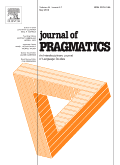
JOURNAL OF PRAGMATICS
Exploring the Dynamics of Language UseJournal of Pragmatics, published by Elsevier, is a premier interdisciplinary journal dedicated to the exploration of language use as a dynamic social phenomenon. Established in 1977 and set to continue through 2024, it serves as a vital resource for researchers across various fields, including Artificial Intelligence, Linguistics, and Language Studies. With an impressive Q1 ranking in Linguistics and Language and a Q2 ranking in Artificial Intelligence, the journal has made significant contributions, supporting a diverse range of theoretical and empirical research. It boasts a solid reputation, evidenced by its strong positions in Scopus rankings—occupying the 91st percentile among the best in the Social Sciences and 92nd in Arts and Humanities. Although it does not currently offer open access, the Journal of Pragmatics remains essential for professionals and scholars seeking to deepen their understanding of pragmatics and its applications in language technology, societal interaction, and cognitive processes. With its international reach and high standards, this journal is a cornerstone for anyone dedicated to advancing knowledge in the fields of language and communication.

International Review of Pragmatics
Connecting Ideas, Bridging Disciplines in PragmaticsInternational Review of Pragmatics is a leading scholarly journal published by BRILL, renowned for its contribution to the fields of Communication, Linguistics and Language, and Psychology. With an ISSN of 1877-3095 and an E-ISSN of 1877-3109, this journal offers a rigorous platform for high-quality research and theoretical contributions that explore the complexities of pragmatics across various domains. Situated in the Netherlands, the journal is currently ranked in the Q2 quartile for both Communication and Linguistics, reflecting its substantial influence and academic excellence. The Scopus rankings further emphasize its importance, with percentile rankings in the 55th to 78th range across several relevant categories. Since its inception in 2014, the journal has consistently pursued the objective of fostering interdisciplinary dialogue and advancing scholarly discourse in pragmatics. Although the journal does not currently offer open access options, it remains committed to accessibility in academia through various channels. Researchers, professionals, and students alike will find valuable insights and contemporary discussions that propel the field forward, making International Review of Pragmatics an essential resource for those dedicated to understanding the intricacies of human communication.
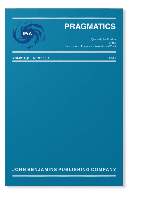
Pragmatics
Pioneering new frontiers in the study of pragmatics.Pragmatics is a premier international journal dedicated to the exploration and development of the field of pragmatics, published by John Benjamins Publishing Co. This esteemed journal, with an ISSN of 1018-2101 and E-ISSN 2406-4238, offers a vital platform for interdisciplinary research in linguistics, philosophy, and social sciences, making significant contributions to scholarly discourse since its convergence in 2005. Recognized for its high-impact research, Pragmatics boasts a prestigious Q1 ranking in both Linguistics and Language and Philosophy as of 2023, with impressive Scopus rankings that place it in the top percentiles of its categories. The journal aims to enhance understanding of communication in diverse contexts and encourages submissions that reflect innovative theoretical perspectives and empirical findings. Although not an open-access journal, it is essential for researchers, professionals, and students seeking to stay at the forefront of pragmatic studies and related disciplines. With its base in Belgium and an address in Amsterdam, Pragmatics continues to influence global conversations in the humanities and social sciences.
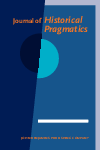
Journal of Historical Pragmatics
Fostering Dialogue Between History and PragmaticsJournal of Historical Pragmatics, published by JOHN BENJAMINS PUBLISHING CO, stands as a pivotal platform in the field of linguistics, focusing on the intersection of language, history, and pragmatics. With its ISSN 1566-5852 and E-ISSN 1569-9854, this esteemed journal has been curating scholarly discussions since 2000, with a converged publication timeline extending to 2024. Acknowledged for its academic rigor, it holds a commendable Q2 category ranking in the Linguistics and Language domain and features impressive Scopus rankings, being placed at #202 out of 1088 in Arts and Humanities and at #237 out of 1167 in Social Sciences. The journal is instrumental in advancing our understanding of historical language use and its sociocultural ramifications, offering researchers, professionals, and students a rich repository of articles that contribute to both theoretical and practical applications in historical linguistics and pragmatics. By fostering interdisciplinary dialogue and promoting innovative methodologies, Journal of Historical Pragmatics not only enriches scholarly literature but also strengthens the global academic community in uncovering the complexities of language through time.

Language and Linguistics
Connecting Cultures through Linguistic ResearchLanguage and Linguistics is a leading academic journal published by ACAD SINICA, INST LINGUISTICS, based in Taiwan. Established in 2008, this journal has rapidly gained recognition within the field of linguistics, achieving a commendable ranking of Q2 in the 2023 category quartiles and holding positions in the top percentiles of Scopus rankings for both Arts and Humanities and Social Sciences. With an ISSN of 1606-822X and an E-ISSN of 2309-5067, the journal aims to foster the development of linguistics research by providing a platform for the dissemination of innovative and interdisciplinary studies. While it currently operates on a traditional subscription model, its significant contribution to the advancement of linguistic theory and its applications makes it an invaluable resource for researchers, professionals, and students alike. Spanning converged years from 2008 to 2024, Language and Linguistics continues to shape the dialogue in understanding language phenomena and encourages submissions that push the boundaries of current linguistic knowledge.